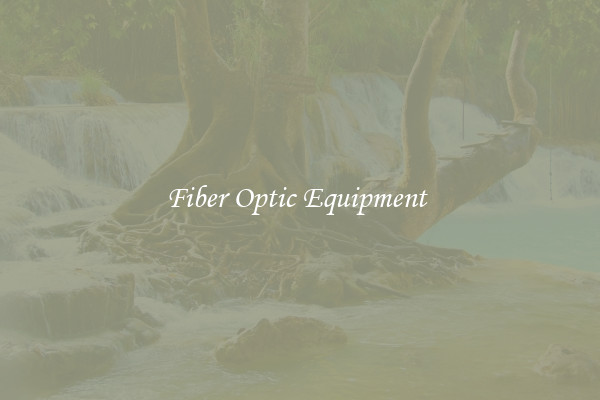Fiber Optic Equipment
Fiber optic equipment has revolutionized the way we transmit and receive data. From improved internet connectivity to increased communication speeds, fiber optic technology has become an integral part of our daily lives. In this article, we will explore the importance of fiber optic equipment and its various uses.

Fiber optic equipment consists of various components that work together to transmit data using light. These components include fiber optic cables, connectors, transmitters, receivers, and amplifiers. Fiber optic cables are made of thin strands of glass or plastic that are capable of transmitting data over long distances with minimal signal loss. This makes them ideal for transmitting large amounts of data quickly and efficiently.
One of the key advantages of fiber optic equipment is its high bandwidth capacity. Unlike traditional copper cables, fiber optic cables have greater bandwidth, allowing for the transmission of large amounts of data simultaneously. This is particularly important in today's digital age, where the demand for fast and reliable internet connectivity is ever-growing.
Another advantage of fiber optic equipment is its immunity to electromagnetic interference (EMI). Copper cables are susceptible to EMI, which can disrupt data transmission and reduce signal quality. However, fiber optic cables are immune to EMI, making them highly reliable and suitable for use in environments with high electromagnetic fields, such as power plants and oil rigs.
Fiber optic equipment is widely used in various industries, including telecommunications, healthcare, and defense. In telecommunications, fiber optic cables are used to transmit voice, data, and video signals over long distances. This technology has greatly improved communication speeds and enabled the consistent delivery of high-quality audio and video content.
In the healthcare industry, fiber optic equipment is used for medical imaging, such as endoscopy and microscopy. The high bandwidth and low latency of fiber optic cables allow for the quick and accurate transmission of images, enabling doctors to make timely and informed decisions.
The defense industry also heavily relies on fiber optic equipment for secure communication and data transmission. The inherent security of fiber optic cables, combined with their high bandwidth capacity, makes them ideal for transmitting sensitive information over long distances without the risk of interception or signal loss.
In conclusion, fiber optic equipment plays a crucial role in our modern society. It provides us with fast and reliable internet connectivity, enables seamless communication, and facilitates the transmission of large amounts of data. With its high bandwidth capacity, immunity to electromagnetic interference, and wide range of applications, fiber optic technology continues to shape the way we connect and interact with the world around us.

View details

View details

View details

View details








